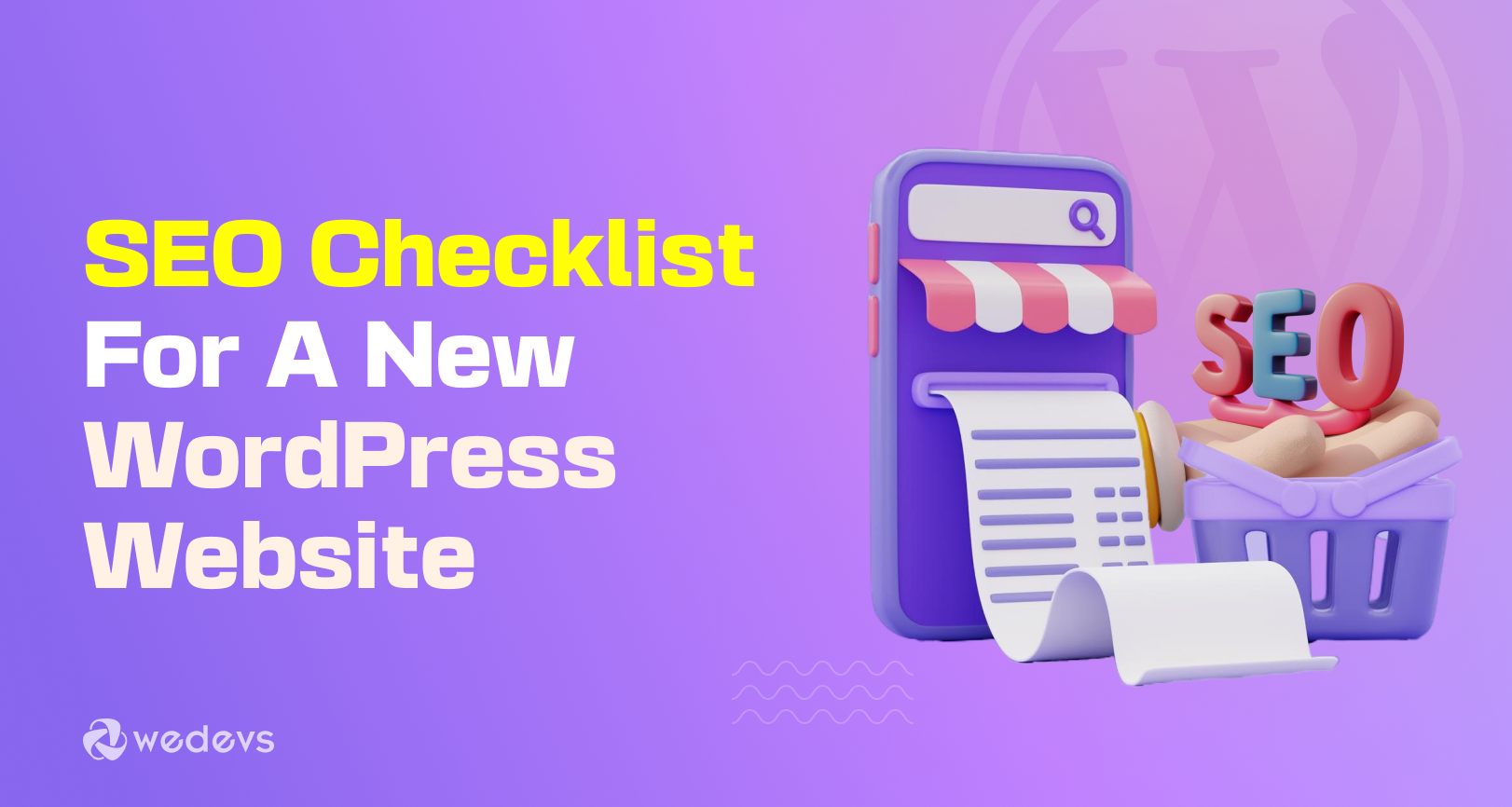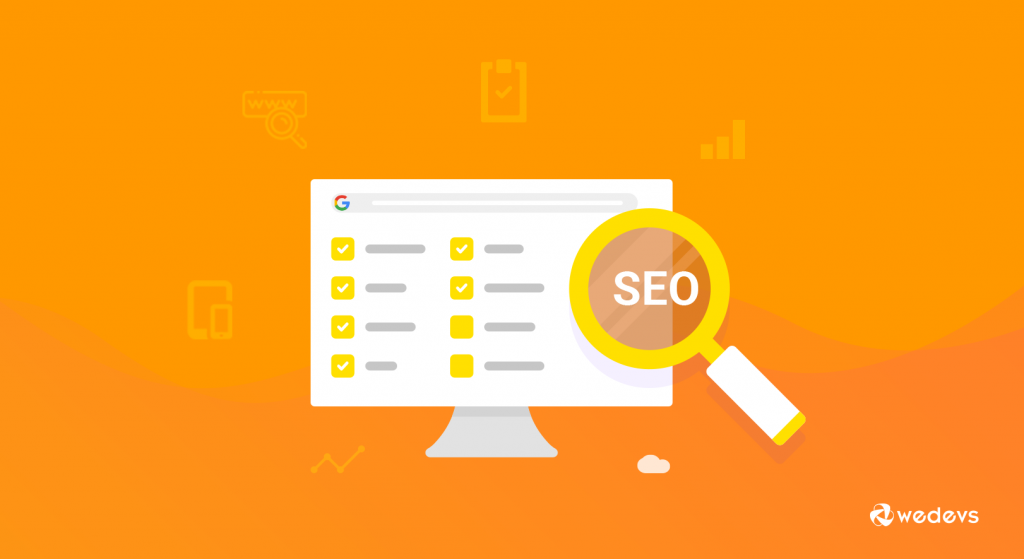
An SEO Checklist for a New WordPress Website in 2026
Are you struggling to rank higher on search engines? This WordPress SEO checklist will give you a complete roadmap.
You have already built your eCommerce site or are in the planning stage. In both cases, one of your main concerns should be showing up at the top of search engines. Your website should come first whenever a potential customer searches for relevant products or information.
This comprehensive guide will walk you through every step to ensure your website ranks high on SERPs and attracts organic traffic like never before.
Why Do You Need An SEO Checklist for Your WordPress Site?

In any industry or niche, there are always two ways you can try to build long-term success: the fast way and the right way.
The former might take a bit less time and offer ‘shortcuts' to online superstardom, but often, it is also the way that entails using dubious techniques that could get you in trouble.
On the other hand, the latter might require some research, preparation, and strategizing, but in the end, you will have established a concrete growth strategy that will take your brand to the stars.
When it comes to SEO, there can be no cutting corners if you want Google to like you and your audience to respect you, especially considering that search engine algorithms evolve and get tweaked daily.
Begging the need for marketers to stay vigilant and compliant while executing the best SEO tactics.
That said, here is your comprehensive WordPress SEO Checklist, which will put your WordPress website on the online map and in front of an expansive digital audience.
- Choose a Reliable WordPress Hosting
- Install a Seo-friendly theme
- Do Proper Keyword Research
- Optimize Your URL Structure
- Use Google Analytics and GSC
- Optimize Site Crawling with Meta Tags
- Check and Fix any Broken Links
- Keep Creating Amazing Content
- Optimize for Handheld Devices
- Tweak Loading Speed for Better UX
Now, let's get into the details!
1. Choose a Reliable WordPress Hosting Provider
A good hosting provider ensures your website is fast, secure, and always available. These factors are critical for both user experience and search engine rankings.
Search engines prioritize websites that are consistently available and accessible to users. A reliable hosting provider ensures minimal downtime, keeping your website up and running 24/7.
Site speed is another crucial ranking factor for search engines like Google. A reliable hosting provider utilizes advanced infrastructure and technologies to ensure fast loading times for your website pages.
Our Recommendations:
- SiteGround
- Bluehost
- WP Engine
Check these guides to get a reliable hosting provider for your WordPress site:
- Things To Consider When Selecting a WordPress Hosting for Your Business
- How To Choose The Right Hosting Environment For Your eCommerce Store
- Managed Hosting for WordPress and WooCommerce Sites
2. Install an SEO-Friendly Theme
Themes affect your site's speed, structure, and user experience—all of which influence SEO.
Once your theme is installed and customized, please take additional steps to optimize it for SEO. This may include optimizing title tags, meta descriptions, heading tags, and image alt attributes and ensuring proper schema markup and structured data implementation.
If you need help installing your WordPress theme, check our beginner-friendly guide.
Our Recommendations:
- Astra
- GeneratePress
- OceanWP
3. Do Keyword Research for Your WordPress Website
First things first, let’s talk about keyword research. The premise seems pretty straightforward: you research a few key phrases relating to your business, and you implement them into your content strategy.
In reality, though, the SEO game is far more complex than that. And if you want your brand to rank high in every search query, you will need to dig deeper for those niche keywords that will bring people closer to your products.

Start by discovering your primary keyword. Then, complement it with numerous secondary keywords that better define your WordPress website's content. You can do this using multiple keyword tools.
Or, you can use Google Suggest to your advantage and incorporate the suggested phrases regarding your niche into your website copy.
Use this tactic to find your relevant short, mid, and long-tail keywords. So, you can implement them into every page on your website to make search engines take you seriously.
4. Optimize Your WordPress Website's URL Structure
In the world of SEO, URLs can make a big difference. Yet, many people and even marketing experts fail to understand how much a poorly structured URL can negatively impact a website’s ranking. Here’s why URL optimization matters.
How Important is URL for SEO?
Search engines send ‘spiders' to ‘crawl' through your website in search of relevant information that will help them index your website and position it accordingly in a search query.
When skimming your website, one of the first things a crawler will do is inspect your URLs for relevant page information to determine what the page offers.
If the URL is a simple one, the crawler will have a more difficult time indexing the page. On the other hand, if the URL offers plenty of information about the contents on the page, the search engine will be able to position your website accordingly.
That said, one of your priorities should be to conduct an in-depth URL analysis of your WordPress website. This will allow you to rewrite the URLs for site optimization instead of just using the default paths you’re given.
This tactic is great for building a trustworthy relationship with search engines and your audience.
5. Use Google Analytics and Google Search Console
As any comprehensive SEO checklist will undoubtedly tell you, knowledge is power, and there is no better way to acquire relevant information about your site’s performance, and potential than to use the Google Analytics and Google Search Console features readily available to any website owner.
Without these nifty tools, you cannot hope to boost your SEO game in the competitive marketplace.

Google Analytics is a tool that gives you raw statistical information about your website, its traffic, and where the visitors are coming from. This will allow you to direct your attention to more lucrative SEO opportunities in your niche.
To complement this tool, you also want to use the Google Search Console to obtain relevant information about your website’s visibility and performance. It may include information about relevant keywords, which will help you boost your SEO game.
6. Optimize Site Crawling with Meta Tags
Meta what? Meta tags define every page of your website and tell search engines an in-depth story about your website.
Moreover, meta tags have their subcategories or Meta content that creates a complete Meta tag such as
- Meta Descriptions
- Distribution
- Meta Robots
- Yahoo Verification
- Meta Google Verification
- and Meta Keywords

You want to focus on nailing meta descriptions and Title Tags to boost your ranking and make every search engine like your website while giving the searcher concrete, relevant information about the page's contents.
Every page on your website should have a unique Title Tag relevant to its contents, something short and to the point. On the other hand, you want to use Meta Tags to provide more information about the search phrase and reel the visitor in.
Be sure to include your main keyword here for maximum results.
7. Check and Fix any Broken Links
Nobody likes broken website links – your visitors are bound to leave and not come back, and the search engine is more likely than not to lower your overall score.
Needless to say, there can be no broken links on your website, so you always want to check links and repair, eliminate, and restructure them if needed.
There are many online tools that can help you monitor the vitals of your URLs, and you should use one of them to ensure that your links lead to relevant, informative pages that visitors will appreciate.
8. Keep Creating Amazing Content
You've heard this catchphrase a million times, so let's listen to it again: content is king. It separates the good websites from the bad and the downright ugly, and it is your most powerful tool for growth, positioning, and brand awareness in the online world.
Quite simply, amazing content can bring amazing SEO results, while bad (or god forbid, nonexistent) content can ruin your ranking.
Your content strategy should not only aim to please the search engine with proper structure and keywords but also serve as a direct communication tool with your audience. This is why you should focus on creating content primarily for people—effectively improving retention rate by 85% or more.
What You Should Consider to Ensure Content Quality
Here are a few key elements of a winning content strategy that you should remember for your WordPress SEO Checklist:
The content should be relevant to the reader and provide in-depth solutions to their problems.
Length matters, so writing 200-word blog posts won’t help you rank your website higher.

Content needs to be optimized for search engines. But you must focus on readability, storytelling, and the true value of information.
Content should not only come in written form, but it should also come in the form of infographics, images, videos, and more.
Every content on your website should portray your brand’s personality using exact wording, tone of voice, style of writing, and complementary visuals.
9. Optimize for Handheld Devices
We live in a fast-paced world, so your audience increasingly consumes content from handheld devices, such as smartphones and tablets, instead of stationary computers.
Not only is it important for your online presence to appeal to such an expansive audience, but it’s also important to realize just how mobile optimization can affect your overall ranking.
With people around the world spending more time-consuming content on their smartphones, you want to:
Scale images properly to fit every screen type. And make sure every image serves a purpose. Otherwise, discard it.
Optimize your website for seamless mobile use. This means making it easy to navigate your website with touchscreen gestures such as swiping down and double-tapping.
Also, it eliminates the need for the visitor to pinch and zoom – it can be quite a deterrent.
10. Tweak Loading Speed for Better UX
Last but not least, load times matter greatly in a world where people have short attention spans and expect the website to load in under 2 seconds. Simply put, if your page doesn’t load instantly, you can expect your potential customers to skedaddle over to your competitors in search of a better browsing experience.
The best thing you can do to speed up your website's responsiveness is to optimize its visuals (reduce image size) and check if the site’s code is optimized for performance.
More Things You Should Care About (Bonus)
With the above facts, you should be aware of some more things to ensure your desired results. Have a look at the below points.
- Make sure that your site has an SSL certificate installed (If not, do contact your hosting company)
- Install an SEO plugin like Yoast SEO or Rank Math (Both have a free version)
- Generate and submit your sitemap to Google Search Console
- Update the WordPress ping list to ensure quick indexing
- Optimize your WordPress website for local SEO
- Build high-quality backlinks for your WordPress website
SEO is an ongoing process, and it's essential to regularly monitor and analyze your website's performance to identify areas for improvement. Keep track of key metrics like organic traffic, keyword rankings, and conversion rates, and adjust your SEO strategy accordingly to stay ahead of the competition.
A Quick Glimpse of WordPress SEO Checklist

Most Common FAQs on WordPress SEO Checklist
Most changes take 4–12 weeks to show noticeable impact. Technical fixes may help sooner, but content and backlink improvements usually take longer. Stay consistent and monitor progress in Google Search Console.
Yes. An SEO plugin makes your life easier. It helps you manage sitemaps, meta tags, schema, redirects, and more. You can still do SEO without a plugin, but it will take more time and manual setup.
Fast loading pages and strong Core Web Vitals are now at the top. Google wants sites that load quickly, look good on mobile, and give users a smooth experience. Speed optimization is no longer optional.
Use WebP format, compress images before uploading, and add descriptive file names and alt text. Also use an image optimization plugin so the process is automatic. Aim for images under 100 KB whenever possible.
Definitely. Updating old content is one of the easiest ways to gain quick SEO wins. Add fresh info, fix broken links, improve headings, and update screenshots. Google rewards content that stays relevant.
Final Thoughts on WordPress SEO Checklist
SEO is the name of the game in the online world. And no matter what type of business you’re running, you need a strong SEO strategy in place in order to put your website on the digital map. Charm every relevant search engine, and position yourself as the go-to brand in the industry.
With this WordPrress SEO checklist in hand, this seemingly cumbersome task will become a breeze.
This is a guest blog by David Webb, a business consultant, writer, and Senior Editor at BizzMarkBlog.com.

